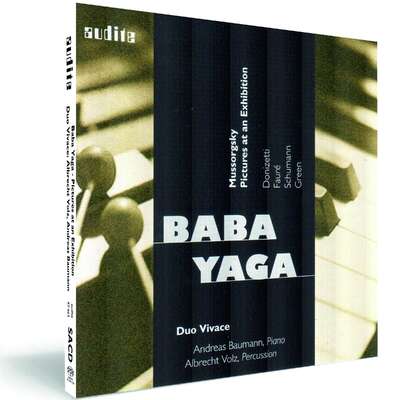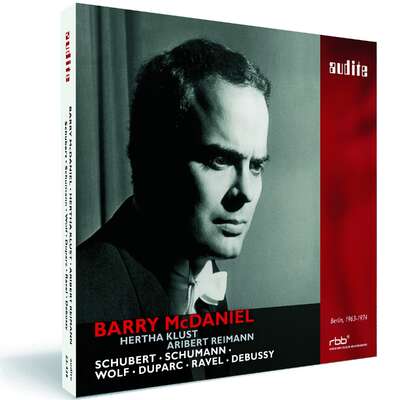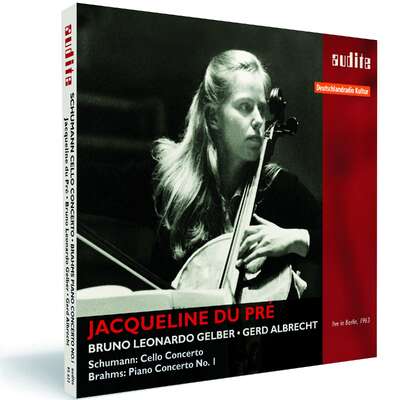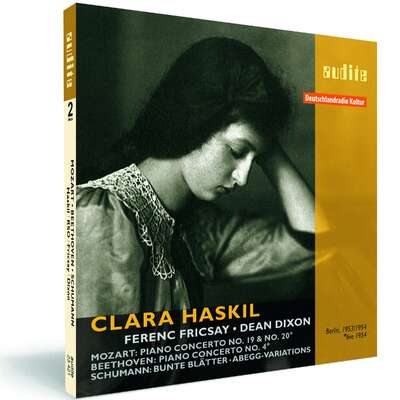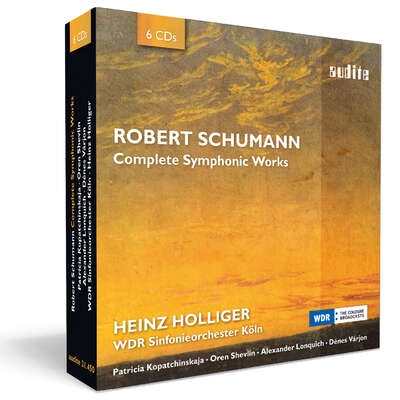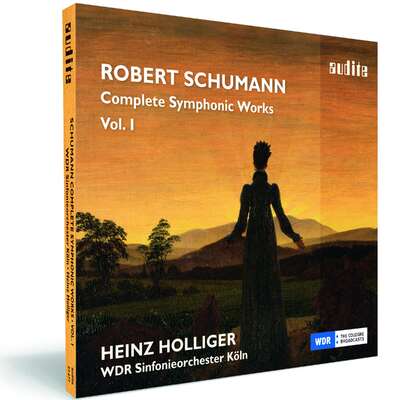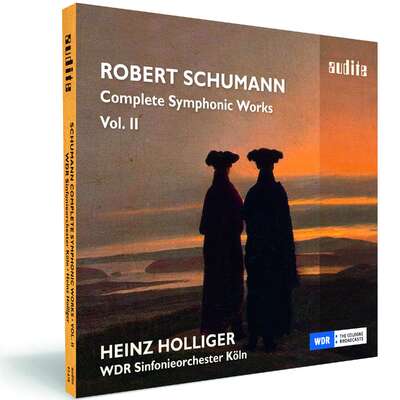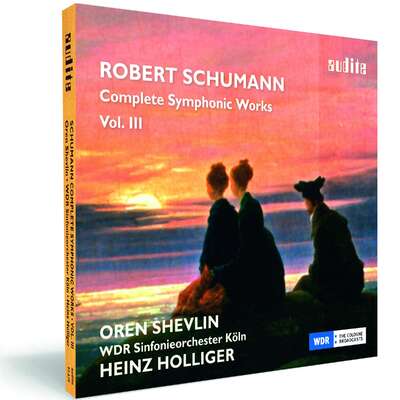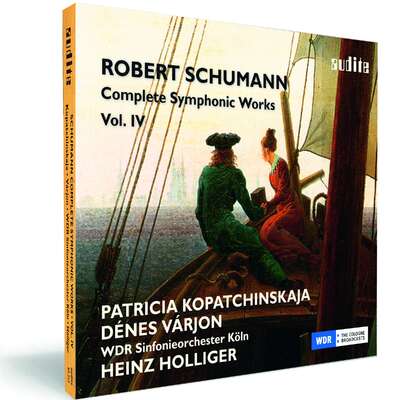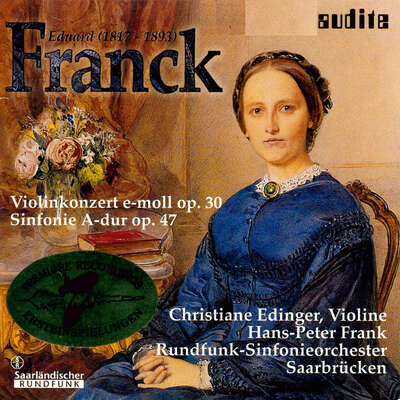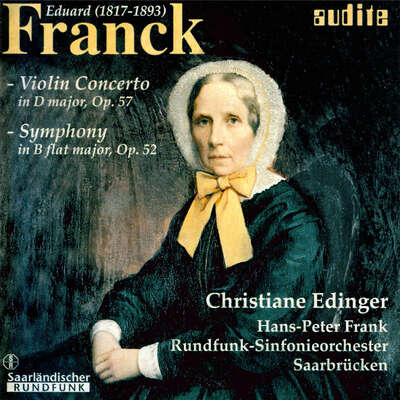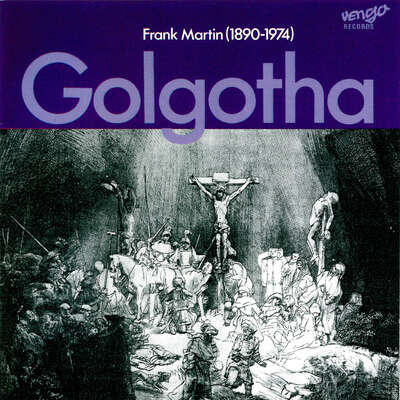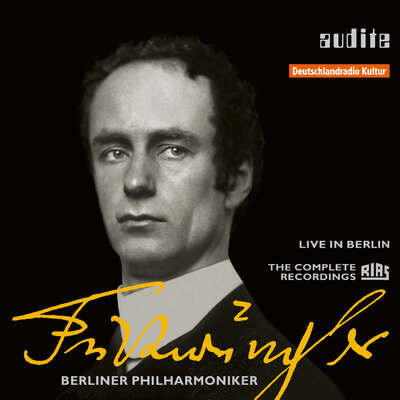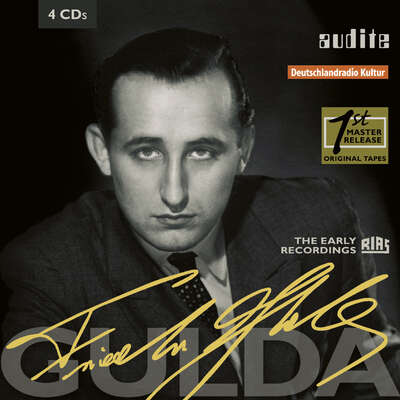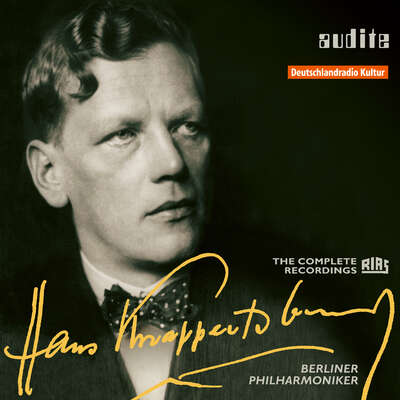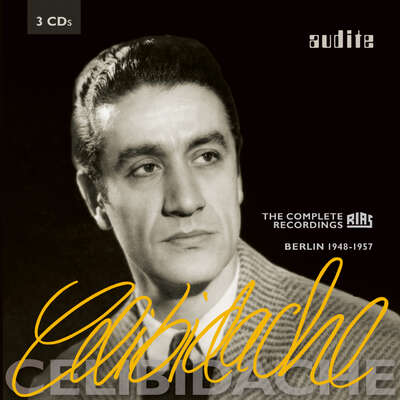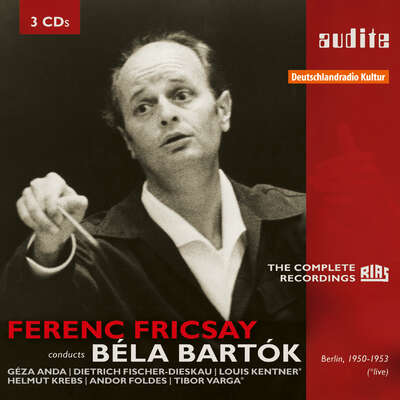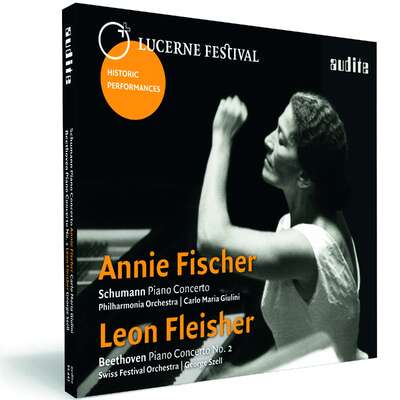
This CD in our “Legendary Recordings” series is the first in a projected set of archive recordings by Ferenc Fricsay. A clear orchestral tone, boundless musical energy and tireless attention to musical form – these are what characterise Fricsay’s work with the Berlin orchestra whose rich...more
"A valuable addition to his small discography is this Audite issue of live performances of Tchaikovsky's Symphony No. 5 with the Berlin Radio Symphony Orchestra, one of the most exciting you'll ever hear, coupled with Schumann's Piano Concerto in a live performance with the RIAS Orchestra and Alfred Cortot as soloist." (classicalcdreview.com)
Details
| Pyotr Ilyich Tchaikovsky & Robert Schumann: Symphony No. 5 & Piano Concerto | |
| article number: | 95.498 |
|---|---|
| EAN barcode: | 4022143954985 |
| price group: | BCB |
| release date: | 30. May 2007 |
| total time: | 80 min. |
Bonus Material
Informationen
This CD in our “Legendary Recordings” series is the first in a projected set of archive recordings by Ferenc Fricsay. A clear orchestral tone, boundless musical energy and tireless attention to musical form – these are what characterise Fricsay’s work with the Berlin orchestra whose rich tradition has continued since 1993 under its new name, the Deutsches Symphonie-Orchester Berlin. Fricsay conducted this orchestra for thirteen years. He shaped its distinctive sound and laid the foundations for open-minded programme planning which always moved with the times. All this, together with his artistic philosophy, left a lasting mark on the orchestra.
This CD presents two examples of Fricsay’s work with the orchestra in Berlin: the unique collaboration with the French pianist Alfred Cortot, who interprets Schumann’s Piano Concerto in the spirit of a Fantasia, and his performance of Tchaikovsky’s Fifth Symphony, which under his baton becomes a drama in sound.
For every production marked with our home page now includes a “Producer’s Comment” from our producer, Ludger Böckenhoff. His immediate impressions, jotted down live during the production process, reveal the thoughts going through his mind as he works on the musical material, revealing how he hears and experiences the music.It’s a subjective impression, giving a close and excitingly vivid insight into the production process. In order to preserve the authentic flavour, we have resisted the temptation to reword this production diary in the style of language more usually employed for press releases.
The first of these “Producer’s Comments”, referring to this CD, can be found here .
Reviews
ensuite Kulturmagazin | Mai 2016 | Francois Lilienfeld | May 1, 2016 Aufnahmen mit Ferenc Fricsay (2.Teil)
[…] Neben der Deutschen Grammophon gebührt auch der Firma audite ein großes Lob für ihre Bemühungen, Fricsay-Aufnahmen einem breiten Publikum zuMehr lesen
Audite 95.498 enthält zwei Konzertmitschnitte. Mit dem inzwischen in «Radio-Symphonie-Orchester Berlin» umbenannten RIAS-Orchester interpretiert Ferenc Fricsay Tschaikowskys Fünfte. Der Vergleich mit der DGG-Aufnahme von 1949 ist interessant: In beiden Aufführungen versteht es der Dirigent, die oft recht scharfen Kontraste zwischen Wildheit und lyrischen Stellen überzeugend darzubringen – und die Streicher des RIAS stehen den Berliner Philharmonikern in nichts nach: Beide Klangkörper sind grossartig. Die audite-Version ist jedoch besser durchdacht, konsequenter aufgebaut, insbesondere in den Mittelsätzen. Dies mag auch am Anlass liegen: Das Konzert vom 24. Januar 1957 fand zum zehnjährigen Jubiläum des Orchesters statt – ein besonders inspirierender Moment. Es ist schön, dass die CD auch die kurze Ansprache des Dirigenten enthält.
Mit dem anderen Dokument auf dieser Platte hat es eine besondere Bewandtnis: Es handelt sich um das Schumann-Klavierkonzert mit Alfred Cortot, 1951 mitgeschnitten. Eine brisante Geschichte, hatte doch Cortot während der deutschen Besatzung Frankreichs intensiv mit den Nazis und dem Vichy-Regime kollaboriert. Er nahm leitende Stellungen an und ignorierte zahlreiche Hilferufe bedrängter Künstler. Dies führte unter Anderem zum Bruch mit seinen früheren Trio-Kollegen und Freunden Jacques Thibaud und PabIo Casals. Doch etwas muss man ihm zugute halten (Das Folgende weiss ich dank den Memoiren von Casals): Im Gegensatz zu zahlreichen Kollegen, die sich mit Lügen und Rechtfertigungen durchschlängelten, oft sogar im Innersten Anhänger der Nazi-Ideologie blieben, zeigte Cortot Reue. Im Sommer 1945 besuchte er unangemeldet den großen Cellisten in Prades. «Es ist wahr, Pablo,» sagte er, «ich habe mit den Nazis gearbeitet, ich schäme mich, ich schäme mich furchtbar. Ich bin gekommen, um dich um Vergebung zu bitten.» So kann man denn die Tatsache, dass Cortot im Mai 1951 in Berlin spielte, auch als Geste der Versöhnung betrachten.
Soweit die zeitgeschichtlichen Hintergründe. Doch wie steht es mit der musikalischen Qualität? Da muss ich leider sagen, dass man diesen Mitschnitt besser hätte im Archiv schlummern lassen sollen. Auch ich bin kein Anhänger der Null-Fehler-Ästhetik (ein Ausdruck von Habakuk Traber im ausgezeichneten Beiheft). Zwei meiner Lieblingspianisten – Arthur Schnabel und Rudolf Serkin – passierten auch gelegentliche Schnitzer, aber eben: Sie geschahen gelegentlich und vermochten nicht, den gestalterischen Gestus zu stören. Bei Cortot jedoch hören wir regelmässig brutale Fehler, man hat dazu das Gefühl, dass Schumanns Partitur ihm gar nicht am Herzen liegt, so viele Willkürlichkeiten und Grobheiten erlaubt er sich.
Doch lassen sie sich nicht abhalten: Der Kauf der CD ist wegen der Tschaikowsky-Symphonie unbedingt empfehlenswert!
Auch in der audite-Serie finden wir Haydn- und Mozart-Symphonien. Leider sind es die gleichen, die schon bei DGG erschienen sind. Dies hängt wohl damit zusammen, dass Schallplattenaufnahmen oft im Anschluss an Radio-Produktionen stattfanden – und vergessen wir nicht, dass die Radio-Aufnahmen meist nicht zur Veröffentlichung bestimmt waren. Natürlich sind die Vergleiche interessant: Aber was gäben wir nicht dafür, statt zweimal KV 201 und KV 543 die «Linzer» und die «Prager» zu haben!
Bei den Haydn-Symphonien 44 und 98 spielt auf der audite Produktion zumindest ein anderes Orchester, nämlich das Kölner Rundfunk-Symphonie-Orchester. (audite 95.584)
Bei Mozart fällt die Unkonsequenz bei den Wiederholungen auf, die wohl oft mit der Sendezeit oder der Beschränkung einer Schallplattenseite zusammenhängt, wenn die Firma unbedingt eine ganze Symphonie auf eine Seite drängen wollte. In der A-dur-Symphonie KV 201 wiederholt Fricsay die Exposition des 1. Satzes bei DG, aber nicht bei audite. In der Es-dur-Symphonie KV 543 hält er es umgekehrt… Bei diesem Werk ist im Übrigen der Vergleich der beiden Fassungen des Trios im 3. Satz reizvoll: Hier die RIAS-Klarinetten mit ihrem samtweichen Ton, bei DG die Bläser der Wiener Symphoniker, die dem Wienerisch-Folkloristischen im Klang näher sind und etwas herber klingen. Die Qualität ist in beiden Fällen fabelhaft.
Die sehr kurze Exposition im g-moll-Werk wird immer wiederholt. (Symphonien Nrn 29, 39, 40: audite 95.596)
Eine absolute Sternstunde bietet audite mit der Einspielung von Donizettis «Lucia di Lammermoor» (audite 23.412). Diese Radio-Produktion von Januar 1954 wurde in deutscher Sprache aufgenommen, was damals eher der Normalfall war. Auch die vorgenommenen Kürzungen – 105 Minuten Spielzeit anstelle von gut anderthalb Stunden – entsprechen der Gewohnheit der Zeit; man musste noch lange auf komplette Aufführungen und Einspielungen warten. Dramaturgisch schwerwiegend ist vor allem das Fehlen der Begegnung zwischen Enrico und Edgardo am Anfang des dritten Aktes, wo sich die Gegenspieler zum Duell verabreden. Dadurch wirkt die letzte Szene – der Monolog Edgardos – nicht ganz folgerichtig. Dazu kommt das Problem, dass zwei gleich aufgebaute Szenen unmittelbar aufeinander folgen: erst Jubel, dann Umschwung ins Dramatisch-Tragische.
Auch die kurze Szene nach der Wahnsinnsarie, in der Enrico Reue zeigt, wäre für den dramatischen Ablauf wichtig: Ohne sie verschwindet diese Figur plötzlich im Nichts... Interessante Bemerkungen zu diesem Thema sind im Übrigen im ausgezeichneten Beiheft-Text von Habakuk Traber nachzulesen.
Doch, seien wir zufrieden mit dem, was wir haben: Denn die Aufführung ist schlicht und einfach überwältigend! Fricsay erweist sich einmal mehr als hochbegabter Dramatiker, RIAS-Orchester und -Chor (Einstudierung: Herbert Froitzheim) sind in Hochform. Zum Ereignis wird die Aufnahme jedoch durch Maria Staders Interpretation der Lucia. Gesangstechnisch und stimmlich kenne ich keine ebenbürtige Interpretin dieser Rolle, ausser Dame Joan Sutherland – und das ist aus meiner Feder ein Riesenkompliment! Maria Staders Porträt ist im Ansatz allerdings verschieden: Sie ist eine leidende Figur, eine Tragödin der leisen Töne. Den Wahnsinn stellt sie zurückhaltend, als Phantasma dar, nicht als dramatischen Gestus. Dass sie sich dabei genau an Donizetttis Notentext hält, ist ein weiterer Pluspunkt. Und der/die ungenannte Flötist(in) ergänzt den Gesang auf perfekte Weise. Ihr Partner, Ernst Haefliger, bewältigt die für ihn im Prinzip zu gewichtige Partie durch Intelligenz und perfektes technisches Können (ähnlich wie den Florestan im vor einem Monat besprochenen Fidelio). Wenn die beiden Künstler sich im Duett vereinigen, entsteht ein selten erreichter Wohlklang, ein perfektes Zusammengehen zweier zauberhaft schöner Stimmen; wahrlich, wir sind in der Welt des Belcanto!
Dietrich Fischer-Dieskaus Wutausbruch in der ersten Szene geschieht manchmal auf Kosten der Gesangslinie. Doch, ab dem Duett mit Lucia ist seine Interpretation des Enrico ein Modell an Gesang und Differenzierung. Auch die kürzeren Rollen sind sehr gut besetzt. Ein schottisches Sujet, von einem Italiener komponiert, auf deutsch aufgeführt: Wenn die Qualität stimmt, geht auch das!
Erwähnt sei noch, dass audite auf einer Doppel-CD die in der letzten Ensuite-Nummer hochgepriesene Aufnahme der «Fledermaus» als Einzelausgabe veröffentlicht hat (audite 23 411), mit einer hochinteressanten Dokumentation von Habakuk Traber im Beiheft.
Die Tonkunst | Juli 2013 | Tobias Pfleger | July 1, 2013 Edition Ferenc Fricsay – Werke von Haydn, Mozart, Beethoven, Rossini, Bizet, Brahms, Strauß, Verdi, Bartók u. a.
Die Klangtechnik ist für damalige Verhältnisse von sehr hoher Qualität, der helle, fast metallische Charakter des fokussierten Streicherklangs unterstützt Fricsays Ästhetik klanglicher Transparenz und Tiefenschärfe.<br /> [...] In paradigmatischer Weise zeigt sich Fricsays zündende Verbindung von flexibler Begleitung, Sog der Kantilene, rhythmischem Feuer, geschärfter Artikulation und suggestiver Phrasierung in den Opern- und Operettenaufnahmen; sie bilden weitere Höhepunkte der Edition.Mehr lesen
[...] In paradigmatischer Weise zeigt sich Fricsays zündende Verbindung von flexibler Begleitung, Sog der Kantilene, rhythmischem Feuer, geschärfter Artikulation und suggestiver Phrasierung in den Opern- und Operettenaufnahmen; sie bilden weitere Höhepunkte der Edition.
Prestige Audio Vidéo | 9/3/2009 | Michel Jakubowicz | March 9, 2009 Tchaikovski (Symphonie N° 5) et Schumann (Concerto pour piano)
Depuis toujours, Ferenc Fricsay s'est passionné pour les Symphonies deMehr lesen
Universitas | September 2008, Nummer 747 | Adelbert Reif | September 4, 2008
Der Dirigent Ferenc Fricsay ist heute eine Legende. Im europäischenMehr lesen
klassik.com | März 2008 | Dr. Rainhard Wiesinger | March 3, 2008 | source: http://magazin.k... Geburtstagsgeschenk
Den 60. Geburtstag des DSO Berlins nimmt das Label audite zum Anlass, umMehr lesen
Fanfare | March/April 2008 | Tom Godell | March 1, 2008
A talented Hungarian conductor who died young and a legendary French pianist who lived long past his prime combine, in concert, for one of the leastMehr lesen
Tchaikovsky's Fifth Symphony begins in promising fashion with an exceptionally slow and dark-hued introduction. The Allegro begins at a reasonable clip, but Fricsay soon slams the pedal to the metal. His breakneck pace leaves little, if any room for subtlety or expression. When he does finally slow down a bit at the beginning of the recapitulation, the result sounds hopelessly stiff and stodgy. The second movement is treated in similar fashion. Once past the glacially paced opening bars, Fricsay breezes through the remainder of the movement as if he can't wait to get it over with. The Scherzo is icy, and the finale lacks any discernable Russian flavor or passion. Tempos here are so fast that the orchestra simply can't stay together. The sound of the broadcast tape is harsh and gritty with metallic strings, boxy tuttis, and a dynamic range that runs the gamut from mezzo forte to forte and back.
In the 1920s, Alfred Cortot made some of the finest trio recordings ever with his erstwhile friends Pablo Casals and Jacques Thibaud. With orchestra he made spirited recordings of the Saint-Saëns Fourth Concerto and Franck's Symphonic Variations. He was also one of the most penetrating and sensitive interpreters of the solo music of Robert Schumann. Nonetheless, Cortot was hardly the greatest keyboard technician. In his early years, though, his miscues rarely disrupted the flow of the music or the power of his expression. Alas, that is not the case here.
By the time this concert took place, Cortot's technique was almost completely gone. There are fleeting moments when he effectively expresses the poetry inherent in the music, but whenever bravura showmanship and heroism are required, Cortot simply cannot muster the necessary energy or power. His interpretation lacks any sense of purpose or direction, and wrong notes are as common as ants at a Memorial Day picnic. More than once I was reminded of the spectacle of David Helfgott's embarrassing concerts. Fricsay, to his credit, desperately tries to hold up his end of the bargain, but even his best efforts cannot save this misbegotten travesty. The microphone seems to have been placed directly under the piano, ensuring that we don't miss a single flaw in Cortot's miserable performance.
Neue Musikzeitung | 2008/02 | Seite 39 | 57. Jahrgang | Februar | Hanspeter Krellmann | February 1, 2008
Alte Pianisten oder: Falsche-Noten-Spielern zum Lobe
Beethoven-, Chopin-, Reger- und Schumann-Einspielungen
Wettbewerbe demonstrieren unüberhörbar: nie ist besser Klavier gespieltMehr lesen
Scherzo | Enero de 2008, Num. 226 | Enrique Pérez Adrián | January 1, 2008
Audite, el sello alemán que distribuye Diverdi, nos trae tres interesantesMehr lesen
Audiophile Audition | December 2007 | Gary Lemco | December 4, 2007
To mark the 10th anniversary of the RIAS Symphony Orchestra, conductorMehr lesen
Rondo | November 2007 | Christoph Braun | November 16, 2007
Was hat man sie nicht geprügelt: Selbstbemitleidung, Mondscheingeschmuse,Mehr lesen
Classic Record Collector | Autumn 2007 | Christopher Breunig | October 1, 2007
At the end of 1948 Ferenc Fricsay became chief conductor of the RIAS Orchestra (now the Deutsche SO); nine months later he made his first recordingMehr lesen
Audite has provided material of true documentary value. ‘Whatever you think of them, the performances certainly make you listen’, remarked a friend. The Schumann is a frustrating amalgam of eloquence, wrong notes by the handful and quirky phrasing and timing, suggesting Cortot had lapsed into some kind of unthinking routine in the 17 years since his fine set of 78s with LPO/Ronald (Naxos 8.110612). Fricsay skilfully tailors the accompaniment to his fallible soloist’s interpretation. It’s a pity we never had an Anda/Fricsay Schumann Concerto.
His account of the Tchaikovsky is far less ‘safe’ than in that studio version. The introduction is so meticulous that one holds one’s breath – yet it lasts an eternity! Later on, some passages have a frenzied air. Surprisingly, the solo horn in (ii) is quite hurried, although after those pivotal pizzicato mf chords at 108 Tempo I (Fricsay gave them less weight than Karajan) the same theme is taken, full orchestra, far more slowly. Fricsay is generally seen as a romantic, yet for me (and for DG’s then artwork department, one must infer) he was a modernist, absolutely at home in music demanding analytical clarity. In the Fifth we are given a kind of distanced representation of the emotional impetus of the work, whilst texture and dynamic markings are explicitly dissected. The sound quality is, incidentally, far superior to the edgy digital mastering of the 1949 Jesus-Christus-Kirche production (no match for its analogue predecessors).
Pizzicato | Oktober 2007 | Rémy Franck | October 1, 2007
Deutschlandradio und Audite beginnen mit dieser CD die Veröffentlichung von Archivaufnahmen des Berliner Radiosymphonieorchesters (ehemals RIAS, dannMehr lesen
Crescendo | 06/2007 - Oktober / November 2007 | Uwe Schneider | October 1, 2007 Fricsay mit Schumann – Gnadenlos musischer Furor
Hingabe. Tschaikowsky mit Schmackes, einer breiten Skala von Emotionen undMehr lesen
RBB Kulturradio | September 2007 | Angelika Lucchesi | September 21, 2007
Nicht nur brandneue Aufnahmen sind es, die uns verführen, eine CD zu erwerben. Gerade die Raritäten, besondere Interpretationen sind es, die manMehr lesen
Die 1. CD enthält Mitschnitte von 1951 und 1957, die eine ganz andere Atmosphäre vermitteln und für heutige Ohren sicher gewöhnungsbedürftig sind, aber sie haben einen ganz eigenen Musizierstil, es überträgt sich auch klanglich – trotz mono – eine beispielgebende Musizierlust und man staunt, mit welcher Unbekümmertheit der doch schon betagte Alfred Cortot sich noch einmal an das a-moll Konzert von Schumann gewagt hat. Da wird tüchtig daneben gehauen, als ob man eine Probe mitgeschnitten hat, dennoch vermittelt sich vom musikalischen Ganzen ein in sich geschlossenes Konzert, dank Fricsay, der die Fäden trotz des sehr freien Spiels des Solisten fest in der Hand und nie die Nerven verloren hat.
Diapason | septembre 2007 | Rémy Louis | September 1, 2007
Nul ne s'en plaindra : après Kubelik, Fischer-Dieskau et Böhm, Audite inaugure un cycle dédié à Ferenc Fricsay et au RSO Berlin (ex RIAS, puisMehr lesen
Le Concerto pour piano de Schumann, issu d'un concert de 1951, est quant à lui résolument à part - déjà diffusé en vinyle et CD, il trouve ici sa meilleure édition. Pour son ultime et tardif témoignage dans l'œuvre, régulièrement trahi par ses doigts, Alfred Cortot paraîtra de prime abord ralenti, alangui, parfois étrangement solennel. Mais, même ruiné, il de meure ce poète à la sonorité et au toucher hors de pair, aux phrasés qui s'inventent en avançant, capable d'inspirations irrésistibles (la section centrale de l'Allegro affetuoso, cette cadence qui prend vie peu à peu), et aussi de sursauts fulgurants (Allegro vivace, pourtant à deux doigts du collapsus pur et simple au début). Fricsay épouse ses changements d'humeurs et de tempo, ses visions comme ses errances, avec un dévouement absolu... et une virtuosité accomplie. Ce document si magnifiquement imparfait n'efface pas le souvenir des versions officielles laissées par Cortot (toutes trois avec Landon Ronald) ; mais troublant, entêtant, il vous poursuivra longtemps une fois entendu.
www.classicstodayfrance.com | Août 2007 | Christophe Huss | August 24, 2007
Ce CD, qui bénéficie d'un report des plus attentifs et du recours à desMehr lesen
www.classicalcdreview.com | August 2007 | R.E.B. | August 1, 2007
The career of Hungarian conductor Ferenc Fricsay was tragically cut shortMehr lesen
Journal de la Confédération musicale de France | N° 531, août 2007 | Jean Malraye | August 1, 2007
Fricsay est assurément l'un des tout grands chefs du XXe siècle. MortMehr lesen
www.concertonet.com | 06/28/2007 | Antoine Leboyer | June 28, 2007
Voici un vrai document historique : la rencontre entre Alfred Cortot etMehr lesen
Fono Forum | August 2007 | Peter T. Köster Legenden in seltenen Aufnahmen
Das aktuelle Angebot an historischen Orchesteraufnahmen bietet interessante Alternativen und Ergänzungen zur Diskographie der großen Maestri. VorMehr lesen
Im Jahr 1951 fand in Berlin ein ungewöhnliches Aufeinandertreffen der Generationen statt: Der damals 74-jährige Alfred Cortot, Poet des Klaviers und einer der letzten großen Vertreter der romantischen Schule, spielte Schumanns Klavierkonzert zusammen mit dem RSO Berlin unter dem gerade einmal halb so alten Ferenc Fricsay, Exponent eines modernen Dirigententyps und Ingenieur eines trockenen, glasklaren Orchesterklangs. Mit der Veröffentlichung des Live-Mitschnitts startet das Label Audite eine neue Reihe, die dem im Alter von nur 48 Jahren an Krebs gestorbenen Dirigenten gewidmet ist. Wer an falschen Tönen im Klavier Anstoß nimmt, sollte das Geld sparen, doch wer musikalische Erlebnisse jenseits der Null-Fehler-Ästhetik sucht, kann hier Zeuge einer ganz außergewöhnlichen Zusammenarbeit werden. Absolut spannend ist auch Fricsays aufgeheizte Wiedergabe der fünften Tschaikowsky-Sinfonie, die beim Festkonzert zum zehnjährigen Bestehen des RSO mitgeschnitten wurde – ein gelungener Auftakt zu einer viel versprechenden Serie.
Ebenfalls bei Audite erscheint eine Reihe von Rundfunkaufnahmen mit Karl Böhm, deren erste Folge mit Live-Mitschnitten des WDR neben Böhms Hausgöttern Strauss („Don Juan“) und Mozart (Sinfonie Nr. 28) auch die „Feuervogel“-Suite von Igor Strawinsky enthält – ein Komponist, der bisher in Böhms Diskographie fehlte. Wie immer klingt auch diese Partitur bei Böhm solide-bodenständig und einleuchtend. Sein Musizieren hat etwas Körperliches, bietet sozusagen Musik zum Anfassen.




























